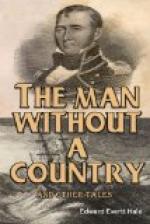I was in the Civil Service at Richmond. Why I was there, or what I did, is nobody’s affair. And I do not in this paper propose to tell how it happened that I was in New York in October, 1864, on confidential business. Enough that I was there, and that it was honest business. That business done, as far as it could be with the resources intrusted to me, I prepared to return home. And thereby hangs this tale, and, as it proved, the fate of the Confederacy.
For, of course, I wanted to take presents home to my family. Very little question was there what these presents should be,—for I had no boys nor brothers. The women of the Confederacy had one want, which overtopped all others. They could make coffee out of beans; pins they had from Columbus; straw hats they braided quite well with their own fair hands; snuff we could get better than you could in “the old concern.” But we had no hoop-skirts,—skeletons, we used to call them. No ingenuity had made them. No bounties had forced them. The Bat, the Greyhound, the Deer, the Flora, the J.C. Cobb, the Varuna, and the Fore-and-Aft all took in cargoes of them for us in England. But the Bat and the Deer and the Flora were seized by the blockaders, the J.C. Cobb sunk at sea, the Fore-and-Aft and the Greyhound were set fire to by their own crews, and the Varuna (our Varuna) was never heard of. Then the State of Arkansas offered sixteen townships of swamp land to the first manufacturer who would exhibit five gross of a home-manufactured article. But no one ever competed. The first attempts, indeed, were put to an end, when Schofield crossed the Blue Lick, and destroyed the dams on Yellow Branch. The consequence was, that people’s crinoline collapsed faster than the Confederacy did, of which that brute of a Grierson said there was never anything of it but the outside.
Of course, then, I put in the bottom of my new large trunk in New York, not a “duplex elliptic,” for none were then made, but a “Belmonte,” of thirty springs, for my wife. I bought, for her more common wear, a good “Belle-Fontaine.” For Sarah and Susy each, I got two “Dumb-Belles.” For Aunt Eunice and Aunt Clara, maiden sisters of my wife, who lived with us after Winchester fell the fourth time, I got the “Scotch Harebell,” two of each. For my own mother I got one “Belle of the Prairies” and one “Invisible Combination Gossamer.” I did not forget good old Mamma Chloe and Mamma Jane. For them I got substantial cages, without names. With these, tied in the shapes of figure eights in the bottom of my trunk, as I said, I put in an assorted cargo of dry-goods above, and, favored by a pass, and Major Mulford’s courtesy on the flag-of-truce boat, I arrived safely at Richmond before the autumn closed.
I was received at home with rapture. But when, the next morning, I opened my stores, this became rapture doubly enraptured. Words cannot tell the silent delight with which old and young, black and white, surveyed these fairy-like structures, yet unbroken and unmended.




